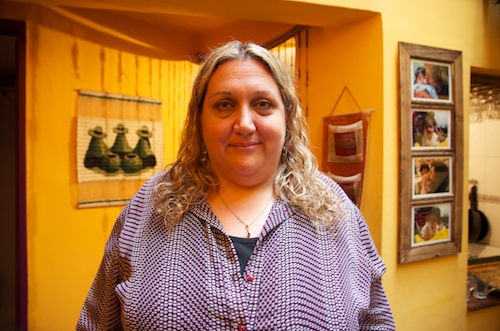If you want to get a tough job done, sick find a lesbian. Maria Rachid, healing former president of the Argentina LGBT Federation and current legislator in the city of Buenos Aires is one of those power lesbians who makes it happen. She was the leading voice behind Argentina’s 2010 campaign for marriage equality which included full adoption rights. With her leadership, viagra Argentina became the first country in Latin America and the tenth in the world to do so.
We interview Maria in her home in Buenos Aires. As she led us through the entryway, we walked past two megaphones placed near the door ready for action in a moment’s notice for some Supergay community organizing.
Out & Around: What does the legalization of marriage mean for Argentina?
Maria: There are two fundamental aspects of the marriage equality law. The first is the access of rights that you can’t get without marriage…such as sharing a pension, etc. The second is equality. During the campaign some legislatures offered us the approval of civil marriage. We said no because we considered it to be less than. We wanted the same rights with the same names.
Out & Around: What’s it like to be gay in Argentina today?
Maria: In Argentina there are still lots of instances of discrimination. The law of marriage equality didn’t change everything overnight. But it is an important advance and a fundamental tool. It’s not instant equality or social equality but without these steps it would be much harder.
I feel proud of Argentina because today we are a model for equality. Hopefully very soon we’ll have the same rights in all the world.
Out & Around: How has the marriage equality law changed attitudes in Argentina?
Maria: This message changed the perception of the people in many ways. These rights are not just for couples who want to get married. They are for a ton of people who, whether or not they ever get married, will be looked upon differently by their coworkers, family, and neighbors because of marriage equality.
Out & Around: What’s left for Argentina’s LGBT movement?
Maria: At this time in Argentina what I want is for the approval of the law of gender identity. It’s a necessary law for the transgendered people. Trans people live in a dramatic situation in our country, in Latin America, and in the world. They live with extreme violence still.
Plus, it’s a progressive law that other countries can learn from. The law doesn’t ask for a medical diagnosis nor for an operation to change your name. Each person can determine their own identity; they don’t need someone else to diagnosis it for you.
Out & Around: What sparked your work?
Maria: I studied abroad in the US. At that time, I lived in a place with more freedom and it allowed me to think of other possibilities in respect of sexuality. I then came out as a lesbian.
I’ve always wanted to work towards social justice from a young age. I started working with human rights in our country and working for women. It was natural to continue doing the same with sexual diversity.
Out & Around: Have you always had the support of your family?
Maria: For more than 10 years my father did not talk to me as a result of my identity and my activism. For my mom, it was hard for her to understand at first but she slowly deconstructed the stereotypes.
Even though it may be difficult in the beginning for some months or years, when you can share your life with your family openly, the relationships later become much stronger.
Out & Around: Are you married?
Maria: In a TV program I was once asked if I was going to get married. I said, ‘No, I want to be able to get married. I want all the rights. Now that I can, I’m not so sure.’ [joking and laughing]. I’ve been in a relationship now for three years. We plan to get married this year or the next.




